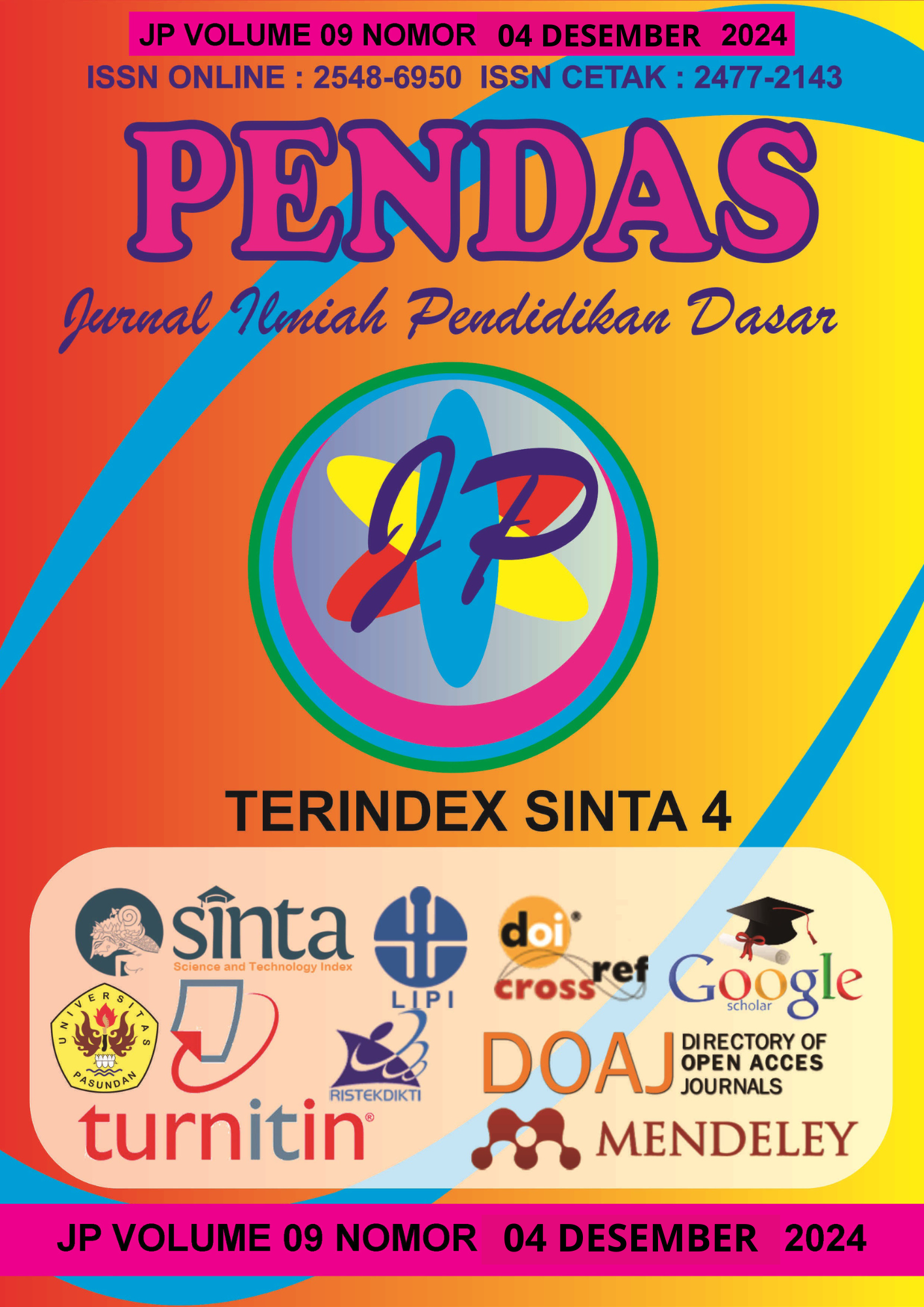HUBUNGAN KONSEP DIRI DAN KEPERCAYAAN DIRI TERHADAP KREATIVITAS SISWA KELAS TINGGI SEKOLAH DASAR INKLUSI DI KEMANTREN GONDOMANAN
DOI:
https://doi.org/10.23969/jp.v9i04.21477Keywords:
Self-Concept, Self-Confidence, Creativity, Inclusive Elementary SchoolAbstract
This study aims to analyze the relationship between self-concept, self-confidence, and creativity among upper-grade students in inclusive elementary schools in the Gondomanan district. The background of this research is driven by Indonesia's low ranking in the Global Innovation Index (GII) in 2023 and the low creativity scores in the 2022 Program for International Student Assessment (PISA). The method used is descriptive quantitative ex post facto with a correlational approach, where data was collected through questionnaires distributed to students. The analysis results show a moderate positive relationship between self-concept and creativity (r = 0.454; p < 0.01) as well as between self-confidence and creativity (r = 0.391; p < 0.01). The R-value analysis for the relationship between self-concept and self-confidence with creativity indicates a value of 0.553, signifying a moderate level of association. Furthermore, partial correlation analysis reveals that the relationship between self-concept and creativity remains significant (r = 0.424; p < 0.01) even when controlling for self-confidence. Similarly, self-confidence also shows a significant positive relationship with creativity (r = 0.355; p < 0.01). The conclusion of this study highlights the importance of both self-concept and self-confidence in influencing students' creativity in an inclusive education setting. These findings are expected to serve as a reference for developing more effective educational strategies to enhance students' creativity.
Downloads
References
Abdurahman, Ayi., Wiliyanti, Vandan., & Tarrapa, Setrianto. (2024). Model Pembelajaran Abad 21. PT. Sonpedia Publishing Indonesia.
Amalia, L., & Ri’aeni, I. (2022). Analisis Komunikasi Interpersonal dalam Pembentukan Konsep Diri Penyintas Covid-19. Journal of Da’wah and Communication, 63(1), 2775–5207.
Azmi, I. U., Nafi’ah, N., Thamrin, M., & Akhwani, A. (2021). Studi Komparasi Kepercayaan Diri (Self Confidance) Siswa yang Mengalami Verbal Bullying dan Yang Tidak Mengalami Verbal Bullying di Sekolah Dasar. Jurnal Basicedu, 5(5), 3551–3558. https://doi.org/10.31004/basicedu.v5i5.1389
Damarhadi, S., Mujidin, M., & Prabawanti, C. (2020). Gambaran Konsep Diri Pada Siswa SMA Ditinjau Berdasarkan Jenis Kelamin. Psikostudia : Jurnal Psikologi, 9(3), 251. https://doi.org/10.30872/psikostudia.v9i3.4392
Dina F., Rita A., Salmiani, Eti G., S. W. (2024). Implementasi Televisi Sekolah Sebagai Media Mengembangkan Aktualisasi Diri di TK IT Syekh Abdurrauf. Ilmu Pendidikan Nonformal, 10(January), 367–378.
Fitriani, F., Fadly, W., & Faizah, U. N. (2021). Analisis keterampilan berpikir analitis siswa pada tema pewarisan sifat. Jurnal Tadris IPA Indonesia, 1(1), 55–67. https://doi.org/10.21154/jtii.v1i1.64
Fitriani, R., Soesilo, T. D., & Setyorini. (2019). Pengaruh Konsep Diri Terhadap Pergaulan Teman Sebaya Siswa Kelas Xi Tei ( Teknik Elektronika. Genta Mulia, X(1), 124–132.
Habib, S., Vogel, T., Anli, X., & Thorne, E. (2024). How does generative artificial intelligence impact student creativity? Journal of Creativity, 34(1), 100072. https://doi.org/10.1016/j.yjoc.2023.100072
Hermawan, I. (2019). Metodologi penelitian pendidikan kuantitatif, kualitatif dan mixed methode. Hidayatul Quran.
Hidayatullah, R. (2020). Kreativitas Dalam Pendidikan Musik : Berpikir Divergen Dan Konvergen Creativity In Music Education : Thinking Divergent And Convergent. Musikolastika, 2(April), 1–7. http://repository.lppm.unila.ac.id/22891/
Mahtumi, Ibu., Purnamaningsih, Ine Rahayu., dan Purbangkara, Tedi. (2022). Pembelajaran Berbasis Proyek (Projects Based Learning). Uwais Inspirasi Indonesia.
Menda, A. S. (2019). Pengembangan Kreativitas Siswa. Guepedia Publisher.
Mimbarwati, M., Mulyono, M., & Suminar, T. (2023). Pengaruh Kepercayaan Diri Terhadap Kemampuan Berpikir Kreatif Matematis Siswa Melalui Model Problem Based Learning Berbantuan Google Classroom. Journal on Education, 5(2), 4102–4109. https://doi.org/10.31004/joe.v5i2.1106
Muhammad, Nurlaila., Hardhienata, Soewarto., dan Setyaningsih, Sri. (2024). Strategi Peningkatan Kualitas Pembelajaran. Historie Media.
Noerchoidah., Estiasih, Soffia Pudji., dan Zuhroh, Rena Sofyatus. (2023). Dasar-Dasar Kewirausahaan. CV Mega Press Nusantara.
Nuryati, N., & Yuniawati, N. (2019). Peningkatan Kreativitas Pada Anak Usia Dini Kelas SD Awal Usia 6-8 Tahun Melalui Metode Praktikum Membatik. As-Sibyan: Jurnal Pendidikan Anak Usia Dini, 4, 1–12.
OECD. (2023). Programme for International Students Assesment (PISA) Result for PISA 2022: Vol. III.
Omnihara, H. W., Marpaung, W., & Mirza, R. (2019). Kepercayaan Diri Ditinjau Dari Dukungan Sosial Pada Penyandang Tuna Netra. Psycho Idea, 17(2), 114. https://doi.org/10.30595/psychoidea.v17i2.4175
Priyambodo, M., Probosari, R. M., & Indriyanti, N. Y. (2021). Correlation between Self Confidence and Adversity Quotient With Creative Thinking Skills of Grade VIII Students On Subject Motion and Force. Jurnal Phenomenon, 11(2), 231–244.
Rais, M. R. (2022). Kepercayaan Diri (Self Confidence) Dan Perkembangannya Pada Remaja. Al-Irsyad, 12(1), 40. https://doi.org/10.30829/al-irsyad.v12i1.11935
Sari, D. U., & Khoirunnisa, R. N. (2021). Hubungan Antara Konsep Diri Terhadap Kepercayaan Diri Mahasiswa Jurusan X Yang Sedang Menyelesaikan Skripsi Di Masa Pandemi Covid-19. Character: Jurnal Penelitian Psikologi, 08(03), 1–11.
Setiawan, D., & Salendur, J. H. H. (2021). Tiktokers: Studi Kasus Tentang Penerimaan Konsep Diri Yang Positif Pada Mahasiswa ITBK Bukit Pengharapan Tawangmangu. Jurnal Teologi (JUTEOLOG), 2(1), 18–33. https://doi.org/10.52489/juteolog.v2i1.44
Sinambela, L. (2023). Metodologi Penelitian Kuantitatif. Grafindo Persada.
Vera, M., & Astuti, S. (2019). Siswa Melalui Model Pembelajaran Problem Based Learning Pada Kelas Vsdn. MAJU: Jurnal Ilmiah Pendidikan Matematika, 6(1), 11–21.
Zulkarnain, Iskandar., Asmara, Sakhyan., dan Sutatminingsih, Raras. (2022). Membentuk Konsep Diri Melalui Budaya Tutur: Tinjauan Psikologi Komunikasi. Puspantara.
Downloads
Published
Issue
Section
License
Copyright (c) 2024 Pendas : Jurnal Ilmiah Pendidikan Dasar

This work is licensed under a Creative Commons Attribution 4.0 International License.














































